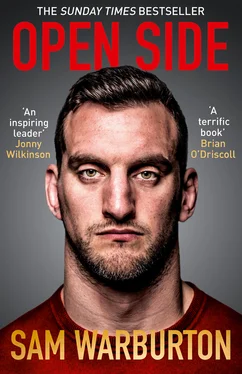‘Exactly.’
‘And your mum?’
‘Born in Somerset. Her folks are Welsh, but her great-grandfather had Scottish roots.’ My full name is Sam Kennedy-Warburton – the Kennedy is Mum’s side, and since she has a sister and their parents were both only children, she wants to keep the name alive – but I don’t use it too often when playing as it’s a bit of a mouthful and makes me sound way too posh.
‘Right,’ he says. ‘Thanks.’
Now he knows that I’m eligible to play for England and Scotland as well as Wales. Sure, I’ve played all my representative rugby for Wales at age-group level, but that doesn’t matter. You can play senior rugby for any country you’re eligible for, and the moment you have your first cap that’s it, you can’t play for anyone else (at least not without taking three years out to qualify for another country). Shit, better cap this kid quick : that’s what the bloke from the WRU’s thinking.
Sure enough, a week or so later I get asked to play for Wales in the World Sevens Series at Twickenham.
It’s a great honour, but I turn it down. First, I don’t want it to interfere with my exams, and second, I’m carrying a knock on my knee. But I assure the WRU that they don’t need to worry about me turning out with a red rose or a thistle on my chest. I’m Welsh through and through, and I’ll never play for anyone else.
LEADERSHIP 1: PERSONALITY
It might sound obvious, but one of the first rules of leadership is this: know who you are. There are as many different styles of leadership as there are personality types, and trying to adopt one that doesn’t suit you is not just pointless but counterproductive.
The WRU once asked us all to take personality tests based on the Myers–Briggs model. These tests assess personality in four main areas:
How you focus attention or get your energy (Extraversion/Introversion)
How you perceive or take in information (Sensing/Intuition)
How you prefer to make decisions (Thinking/Feeling)
How you orient yourself to the external world (Judgement/Perception)
You’re assigned to one category in each area, which means there are 16 possible personality types. I came out as ISFJ: introverted, sensing, feeling and judging.
Introverted people tend to be quiet, reserved, and generally prefer either being alone or with a few close friends rather than a wide circle of acquaintances. They find that large social situations sap energy from them rather than give energy to them. This is why I was the quiet kid on the bus to Bridgend, why I preferred Friday nights in with Ben, my dad and my granddad, and why I bunked off the end-of-year prom!
Sensing people tend to be more concrete than abstract in their thinking, focusing on facts and details rather than ideas and concepts. Hence my choice of A levels, all science-based one way or another rather than arts or humanities, and why I liked to collect data on players while watching Super 15 matches. I was always the kind of player who would do the groundwork first and never try to wing it.
Feeling people tend to value personal considerations above objective criteria. My parents brought me up with strong values, especially as regards treating other people. For example, I would defend kids against bullies even if it made me look bad in the eyes of my mates.
Judging people like to plan things, make decisions a long way ahead of time, and try to ensure that things are as predictable as possible by leaving little to chance. I always liked to prepare the best I could for any test, be it a rugby match or an exam.
ISFJs are often known as Protectors or Defenders, and I fit the broader characteristics of the personality type too. Here are a dozen ISFJ traits that apply to me.
I have a strong work ethic, which sometimes means that I take too much on.
I feel responsible towards others and like to help by sharing my knowledge, experience, time and energy with anyone who needs it.
I like to be conscientious and methodical, to do jobs to the best of my ability, and to see them through to the end.
I like working within established structures and organisations.
I’m deeply devoted to my family and value long-term friendships.
I can be reserved with people I don’t know well, which can sometimes be misread as standoffish.
I don’t like to draw attention to myself, and prefer to work behind the scenes rather than out front.
I don’t seek out positions of authority.
I work well on my own.
I’m receptive to new ideas.
I can take things personally even if they’re not meant that way, and find it hard to wall off my professional life from my personal one.
I don’t like confrontation (at least off the pitch!) and will try to avoid it wherever possible, always seeking to build consensus rather than laying down the law.
All of these traits fed into my leadership style, as you’ll see throughout this book. For example, I was never one for big, rousing speeches or putting myself in front of the camera; I went out of my way to try and get to know the newer boys in the squad; and I felt more comfortable as time went by and I knew the nucleus of the team better.
But what worked for me wouldn’t have worked for other people, because their personalities were different from mine. Leadership only works if your personality informs the way you carry out those leadership duties rather than vice versa. Know yourself, and you’ll know how best you can lead.
2
41.8623°N, 87.6167°W
Saturday, 6 June 2009. Wales v USA
The USA kick off, Ryan Jones catches it, is hit in the tackle – and is knocked out. Literally in the first minute. I’m on the bench as back-row cover. If Ryan comes off, I’m on. Robin turns to me. ‘Get ready.’
Ryan doesn’t come off immediately. He stays on, hoping that if he’s out there long enough he’ll recover. Am I coming on or not? Ryan doesn’t look too great, but it’s not my call.
Thoughts whirl through my head. What do you want? To come on at 50, like you presumed you would? Or now, before you have time to think about it? Are you ready? Doesn’t matter. You have to be ready when they need you.
With 19 minutes gone, Robin and the medics have seen enough. Ryan’s groggy and not playing anywhere like he usually does.
Off he comes. On I go. There’s more than an hour left to play.
This is it. I’m a Wales player now, and no one can take that away from me.
2007. I’m playing for Glamorgan Wanderers when I tear my hamstring. It keeps me out of the whole of Wales’s 2008 Under-20s Six Nations campaign. It’s pretty much the first time I’ve ever been injured, certainly badly enough to keep me out for a match or two. It feels like the end of the world, watching my body waste away while I have to rest and let nature take its course. As if all the good work I’ve put in so far has been for nothing.
Injury #1. It won’t be my last, not by any means.
2008. ‘You should get an agent.’ That’s what I hear time and again. A couple of the other academy boys have already got people interested in them, and of course a lot of the senior Blues players have them already. I get a few names recommended to me, and a few calls from agents sounding me out. They’re all slick and have the sales patter down to a tee, but I bide my time. I want an agent who’s out for me more than for himself, who’s going to look to manage my career in the long term rather than just getting as much money as possible up front.
Then I meet Derwyn. He used to be a player himself – 19 Welsh caps and more than 150 games for Cardiff – so he knows the system and what the game demands.
Читать дальше












